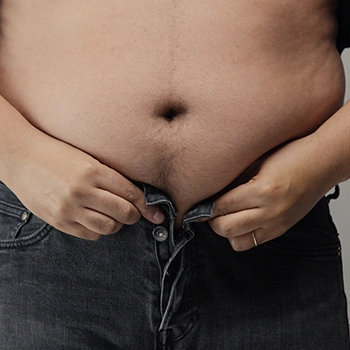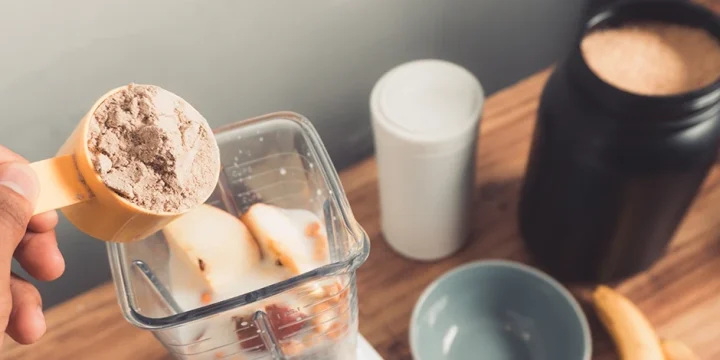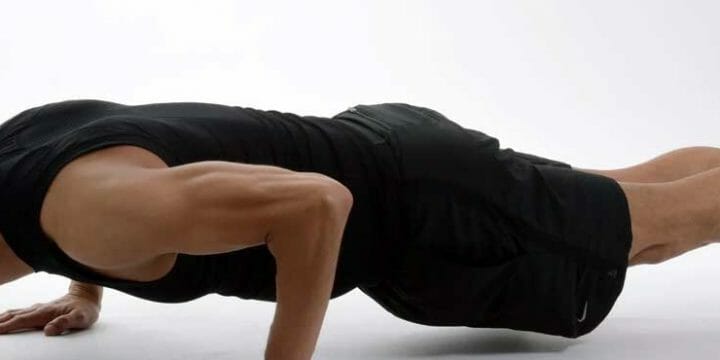Testosterone is critical for muscle growth and many other performance-related functions, but that doesn’t mean building muscle is impossible with low testosterone.
To educate my clients and readers on this particular topic, I compiled what I know from literature and my professional experience and discussed my notes with an endocrinologist.
He also recommended a few more interesting papers on the interplay between low testosterone and muscle building.
Here’s what you should know.
Quick Summary
Is It Possible to Build Muscle with Low Testosterone?

Yes, it’s possible to build muscle with low testosterone. Adopting a healthy diet, exercising regularly, and sleeping enough should enable you to support natural protein synthesis and recovery after exercise.
Keep in mind that all these factors, coupled with natural testosterone boosters, can elevate your testosterone levels and support your muscle-building efforts.
According to Reviews in Urology, normal testosterone levels for a man range between 300 and 1000 nanograms per deciliter [1].
Anything below this could lead to issues such as:
- Sexual health issues like low libido and erectile dysfunction
- Muscle loss
- Decreased bone density
- Fatigue
- Mental health issues such as unhappiness, stress, and depression
By elevating your testosterone levels, you not only avoid these issues but also accelerate lean muscle mass growth and avoid unnecessary fat gain.
“In the absence of testosterone, the hormone estrogen takes over. Estrogen puts fat where you least want it: on your chest and around your belly.”
- Chris Iliades, MD
The build-up of body fat results in even lower testosterone levels, building a feedback loop of low testosterone and more fat.
We’ll get into the ways out of this loop shortly.
For now, let's explore further how the absence of this male hormone depletes muscle tissue.
How Testosterone Deficiency Shrinks Your Muscles

Testosterone is key for muscle growth. Its role in stimulating protein synthesis while inhibiting protein degradation leads to muscle hypertrophy (muscle enlargement).
This means that with low T, you might be actually losing muscle mass.
Additionally, testosterone influences the distribution and type of muscle fibers, with low levels potentially affecting the balance between slow-twitch and fast-twitch fibers, which are crucial for different types of physical activities.
No Muscle Maintenance
With low testosterone, your body’s ability to maintain muscle dwindles.
Here’s how.
You see, muscle cells have special receptors known as androgen receptors that bind testosterone.
By binding on these receptors, the male hormone helps maintain the strength and integrity of muscle fibers.
Conversely, with low testosterone, there is no binding or maintenance, often leading to muscle wasting (muscle loss).
Increased Fat Accumulation

Research published by the Current Diabetes Review has shown that low T levels trigger visceral fat accumulation (abdominal fat storage) [2].
The continual accumulation of fat in your gut leads to the production of an enzyme called aromatase.
This enzyme turns the little amounts of testosterone left into estrogen, leading to increased fat storage in the thighs, abdomen, and chest areas.
Low Energy and Motivation
Low testosterone levels might make you feel tired and depressed.
And with exhaustion and unhappiness, you just aren't motivated to do healthy things like eating right or exercising regularly to lose fat and build muscle.
Moreover, the psychological impact of low testosterone, including its effect on mental health and motivation, can further complicate muscle-building efforts, emphasizing the need for a holistic approach to health and fitness.
It can be a vicious cycle if you’re not careful. But thankfully, there are ways to treat testosterone deficiency and start building lean muscle.
How to Improve Your Levels
There are two legal ways to improve your testosterone level for building muscle mass:
Let’s explore each one in a bit more detail.
Testosterone Replacement Therapy

Testosterone replacement therapy (TRT) is a medical intervention for treating hypogonadism (low testosterone).
Testosterone is administered via these methods:
- Oral
- Injection
- Topical application
- Pellets
- Intranasal (nose spray)
Because of the side effects that come with TRT, it should only be after a doctor's directive.
For a comprehensive understanding of TRT, consider reading our expert Fountain TRT Review.
Now, while TRT is effective as a treatment method for low T, I always advise my clients to opt for natural ways to boost testosterone levels.
Natural Ways To Boost Testosterone

Below are a few ways you can support your body’s natural testosterone production.
1. Vitamin D
Multiple studies over the years have proven that vitamin D is a natural testosterone booster, depending on the context.
From my experience, clients who increased their vitamin D intake, either through diet or supplements, often reported better overall well-being and some improvement in their testosterone levels.
In a weight loss experiment published by the National Institutes of Health, some of the participants were given vitamin D supplements daily for a year in addition to following a weight loss program [3].
At the end of the study, the males who received the supplement had higher levels of testosterone than the rest.
There are many good sources of vitamin D.
You can get it naturally from:
- Exposure to sunlight
- Fatty fish like salmon, tuna, and mackerel
- Egg yolks
- Mushroom
2. Zinc
According to research published by the National Library of Medicine, zinc plays a significant role in regulating serum testosterone [4].
So, adding zinc-rich foods can help you get your testosterone to healthy levels, as per Havard Schoool of Public Health [5].
Zinc-rich foods include:
- Poultry
- Whole grains
- Nuts
- Lobster
3. Protein
Protein aids in raising testosterone levels, in addition to being crucial for muscle growth.
To achieve this boost, you need to add protein-rich foods to your diet.
These include:
- Fish
- Eggs
- Meat
- Legumes
- Dairy products
4. Exercise

A 2015 study published by Wiley Online Library revealed a correlation between low testosterone levels, increased body fat, and weight gain [6]. It showed that losing weight can reduce the risks that come with low testosterone.
Hence, an exercise program that includes high-intensity workouts, strength training, and aerobic exercise can help boost your testosterone levels.
In my practice, I've seen this firsthand. Several of my clients with low testosterone struggled with weight management until they incorporated a balanced exercise regimen.
However, you should be careful not to overdo it because overtraining can negatively affect testosterone levels and may impact your sexual health.
5. Enough Sleep
Scientific studies published by JAMA show that poor sleep can negatively affect your testosterone levels [7]. This is something I emphasize with all my clients.
Furthermore, the role of sleep and recovery in muscle building, especially for those with low testosterone, is critical. Ensuring adequate rest and recovery periods can significantly enhance muscle growth and hormonal balance.
A good night's rest can also help with fatigue, moodiness, and sexual health issues like low libido, which are often attributed to low T.
Natural Testosterone Boosters

Testosterone-boosting supplements consist of natural, science-backed herbs and nutrients that support the body’s natural testosterone production.
They aren’t as effective as some medications, but in our extensive testing, they proved to yield comparable results over the long term and without any major side effects.
FAQs
How Much Testosterone Is Needed to Build Muscle?
About 75-100 mg weekly is the amount of testosterone needed to build muscle according to Clinical Practice Guidelines recommendation [8].
Do Skinny Guys Have Less Testosterone?
No, skinny guys do not necessarily have less testosterone. Unless there are other medical conditions at play, there is no relation between the two. In any case, obese men tend to have low testosterone levels.
Do Testosterone Boosters Help Build Muscle?
Testosterone boosters may help build muscle, particularly in individuals with low testosterone levels. However, for most people, especially those with normal testosterone levels, the effect of over-the-counter testosterone boosters on muscle growth is likely to be minimal.
References:
- https://www.ncbi.nlm.nih.gov/pmc/articles/PMC2725306/
- https://www.ncbi.nlm.nih.gov/pmc/articles/PMC3296126/
- https://pubmed.ncbi.nlm.nih.gov/21154195/
- https://pubmed.ncbi.nlm.nih.gov/8875519/
- https://www.hsph.harvard.edu/nutritionsource/zinc/
- https://onlinelibrary.wiley.com/doi/abs/10.1111/obr.12282
- https://jamanetwork.com/journals/jama/fullarticle/1029127
About The Author
You May Also Like






